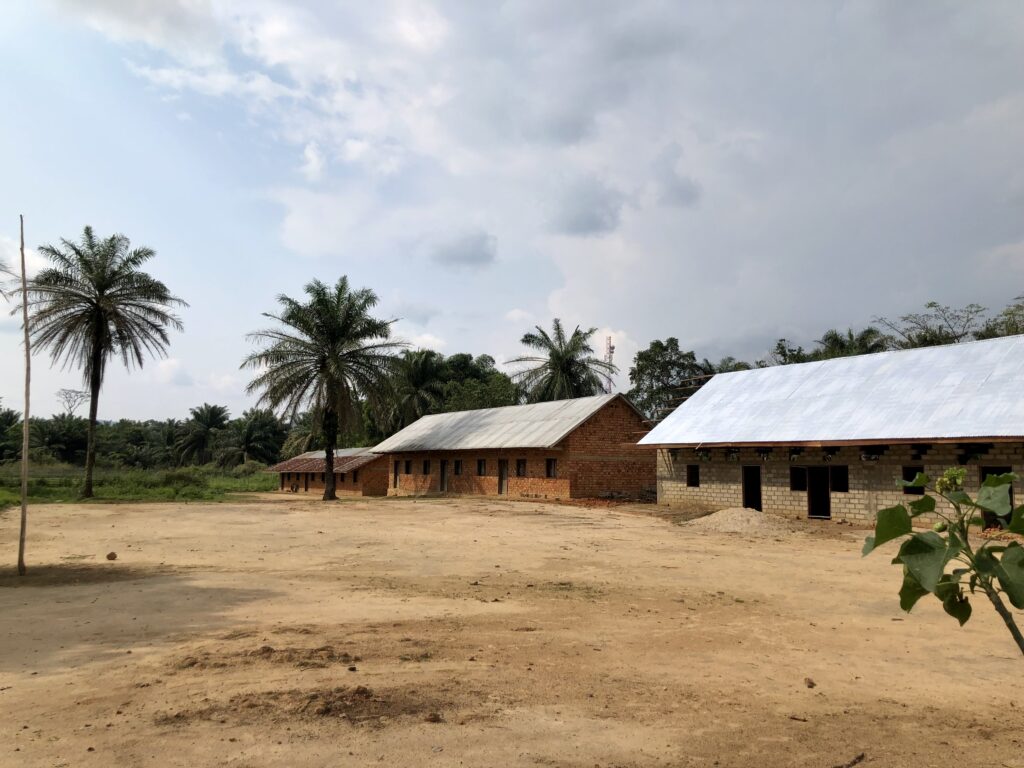05. The Routinized Chaos of Union Académique de Kitindi
Last Friday, I finished my fourth week of teaching at Union Academique de Kitindi. It’s been an interesting time to say the least. Like many things in Congo, our local school is full of contradictions. It has set structures, rules, and procedures, but these are constantly met by breaches, compromise, and, sometimes, counterproductive enforcement. In the end, you learn to expect the unexpected every day, which sounds a bit contradictory but describes the experience quite well. Below I share a description of our typical school day. Ultimately, despite its rules and procedures, messiness is immediately introduced when these are put into practice, and the result is not quite anarchy but a structure that I’ve found daily permits a lot of chaos.

Every morning at Union Academique de Kitindi starts about the same. Our school consists of several single-story buildings surrounding a central yard, altogether measuring about an acre. The first class period begins at 7:30, but students are expected to arrive in advance for assembly in the yard. They all line up according to grade, and, except for Friday, all of them wear the school uniform: a white collared shirt and either navy blue pants or a navy blue skirt. Around 7:20, a single student breaks rank and leads the group in singing some basic Christian song—very frequently it is this pretty catchy and very repetitive song linked here, which talks about the Word of God never passing away and can literally repeat forever (the video is 17 minutes long but you get the idea after about 30 seconds). After the song, the leader calls for all the students to drop their backpacks, stand to attention, and sing l’hymne nationale, which they do a capella while facing the flagpole that may or may not bear a flag on a given morning. Next, the students are addressed by their collective names, primaire d’Union Académique for primary school or secondaire d’Union Academique, for secondary school. The response is the mass of students chanting their school motto which translates to “Ownership, Punctuality, Politeness, Consistency, and Collaboration.” Finally, they must greet the principal, who may deliver a brief morning message and then dismiss them to their respective classrooms.
The whistle blows at 7:30 for the first period, students head to their classes, and then begins the chaos. They leave the assembly area walking orderly—marching even—but within several paces of the classroom door, some grades break into a mad dash. I teach the ninth graders three days a week, and there are hardly ever enough desks in the classroom for everybody. So the students race, scramble, and push to get the first seats, while the others are sent off to find desks elsewhere and carry them across school grounds to our classroom. This week, I noticed that the school has hired some carpenters to build new desks, but up until now, this has been a a daily phenomenon—for the first five minutes of class, I’d have to break up disputes and direct groups of two to four students as they carried several three-person desks into the classroom just so everyone could have a seat. After this daily routine, I start teaching. Or at least I try to.
The English program at this school has suffered a lot. They have never had a native English speaker, and they have rarely had someone with a college education, not to mention English proficiency (remember, for most people here, English is their third or fourth language). Last year, the teacher left mid-year, and the school couldn’t find a replacement. For all these reasons, they are glad to have Henri and me, but it’s made our job difficult. In theory, the students should be at different levels, but there are still many basic things the kids don’t know, including the seniors who have to take the National Exam at the end of the year. So Henri and I have had to be creative. We didn’t feel we could effectively follow the textbooks we were given that correspond with each grade, so we’re using the books and other resources to create our own curricula, trying to meet the students where they are and push them as best as we can.
The daily chaos of teaching here doesn’t make things easy though. Most students arrive and line up on time at assembly, but it’s usually only 65 to 75% of them. The rest show up throughout the day. Whenever a student enters my classroom late, they routinely stop in the doorway, gently clapping or tapping their bag twice to announce their arrival. This formality is cool to see, but usually I’m too frustrated that my lesson has been interrupted to appreciate it. I impatiently gesture for them to enter the room and continue teaching. I’m not sure I’ve taught a day here where a student or several didn’t show up late—once I taught for two periods straight and a student arrived in the last ten minutes of the second period!
I’ve also come to expect daily interruptions in accordance with school or national policies. Once, some men working for the government came and counted all the boys and girls I had in the classroom. Every other day, I get a visit from the director of discipline. He is very amicable with me, but the kids fear him. He patrols around the school, visiting classrooms to perform routine checks and to ensure rules are followed. One time, he came in and confiscated two pieces of jewelry (it violates the dress code). A different day, he came in to find students who had been absent a previous day. He called them out of the room to do manual labor on the school grounds, something that is required of each student for one hour a week but is also sometimes used as a punishment. Another time, he came in and asked where the students’ tools were. It was their day for mandatory manual labor, but most of them hadn’t brought their machetes or shovels from home. He insisted that those lacking tools go home to get them. As they left, leaving me with just 20% of a classroom, I called out to them that they should come back to class when they return, because we had two periods together that day. They ended up coming back about thirty minutes later with twenty minutes still remaining to learn.
Other difficulties: many students don’t pay on time, many students won’t do their homework, and some students don’t understand French so well (it’s a language used primarily in administrative settings, including school, but is easily avoided at home or among friends in favor of a local language). All of these contribute to the messiness of teaching in a place like this, where certain structures like payment plans, attendance, and rules of conduct are provided for but face mixed adherence and effectiveness. They also make it difficult to assess and educate students. Nonetheless, we persist. And I can happily report that despite the difficulties, it’s clear most students are making progress, and I’m excited to see how much they grow by June!

I will be an unpaid volunteer teacher at Union Academique de Kitindi for the 2022-23 academic year. Please consider giving as you are able by clicking the button below or adressing a check to International Berean Ministries and including my name on the memo line. Donations cover room, board, and travel expenses.
International Berean Ministries
PO Box 88311
Kentwood, MI 49518-0311

Hello Kwabene, I just finished reading your blog on “The Routinized Chaos of Union Académique de Kitindi.” I cannot tell if the genre is comedic or tragic–perhaps a combination of the two. I also donated to your support while there, but more importantly, I will be praying for you, as you make a difference in the lives of those you teach.
Be blessed
Hi Mr. Hidalgo—thanks for your comment. I’m not sure what I was going for except to try to paint a picture of how the school operates, including some frustrating things about it and some admirable things. I think tragic comedy might be about right, and it definitely matches the sense of humor of a lot of the kids here, too. Thank you for your prayer and support!